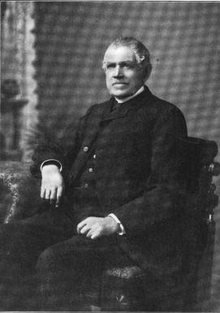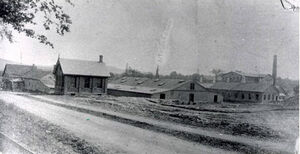
Harvey Goodwin, c. 1850's
Harvey Goodwin (August 17, 1802 - June 11, 1895) was the founder of the Goodwin Brothers Pottery in the Elmwood community of West Hartford, Connecticut. He was a native of New Hartford, Connecticut and a descendant of Ozias Goodwin, one of the founders of Hartford.
Life and Death[]
Harvey Goodwin was born on August 17, 1802 in New Hartford to Pitts Goodwin and Miriam Gilbert. He was the great-great-great-great-grandson of Ozias Goodwin, one of the founders of Hartford, Connecticut.
Throughout his early childhood, he received his primary education and in 1823, at the age of 21, he moved to Torrington, Connecticut, where he engaged in farming and brickmaking. He also learned the potter's trade of his uncle, Seth Goodwin, who had founded a pottery business in Elmwood in 1798, and his cousin, Thomas O'Hara Goodwin. In 1827, he moved from Torrington to West Hartford, Connecticut, and manufactured pottery. He worked in a brickyard for some time until he decided in 1832 to begin his own company in Elmwood, West Hartford. He founded the business based on the manufacture of glazed earthenware, mainly because the consolidation of the business was facilitated by rich clay deposits in Elmwood. During this time, especially in the 1840's, he maintained a brick house on the north side of New Britain Avenue, east of the railroad, a location that served as a tavern as well. A staunch Democrat but never an aspirant for public office, Goodwin did not vote until he was 30 years old, when he cast a vote for Andrew Jackson for President of the United States.
On March 18, 1832, he married Mary Sedgwick, who was born on January 31, 1806 as the daughter of Timothy Sedgwick and Lucy Braman, of West Hartford. The couple had two children (1834 and 1836) before she died on April 18, 1843. After a period of grieving, he married on February 2, 1845 to his second wife, Frances Adelia Elmore, who was born March 31, 1814 as the daughter of Moses Elmore and Eunice Burnham of South Windsor, Connecticut. To them, between 1845 and 1853, the couple had four more children. Goodwin was an earnest member of the Congregational Church in West Hartford; his wife was one of the Methodist Episcopal Church. The two were highly respected and esteemed by all who knew them.

Goodwin Pottery, c. 1892
In the spring of 1854, a petition was sent to the Connecticut General Assembly for the separation of West Hartford from Hartford as an individual town. Goodwin was a member of the strong opposition to the plan, mainly because they were businessmen who had strong ties with Hartford and lived on or near the highways leading to the city. They believed that the proposed division would benefit nobody and that it would greatly increase taxes. Ultimately, the petition was granted in May 1854 and West Hartford was incorporated as a new town. The expansion of the railroad and industrialization in the latter half of the 1800's allowed the pottery business to prosper. In the 1860's, when Goodwin was in his later years, the Goodwin Pottery company employed 75 people in a new three-story building with steam-powered wheels and kilns. The company produced fine china and terracotta. The factory complex was located on the south side of New Britain Avenue, to the west of the railroad.
Between 1870 and 1872, Goodwin passed on the pottery business to his sons and retired to his home at 1198 New Britain Avenue in Elmwood. Goodwin remained a temperate man, retaining good health and remarkable eyesight into the 1890's. At the end of May 1895, he began to suffer from a bout of pneumonia. On June 11, 1895, at 4:25 am, he died at the age of 92 at his home on New Britain Avenue. His widow, Frances Elmore, lived until November 8, 1897.
Children[]
By Mary Sedgwick:
- Ann Amelia Goodwin - m. Samuel P. Burnham
- Lucy Sedgwick Goodwin - died young.
By Frances Elmore:
- Harvey Burdette Goodwin - m. Anne Bramley
- Wilbur Elmore Goodwin - m. Ella J. Waters
- Newell E. Goodwin - unmarried, died in 1904.
- Clarence Beamont Goodwin - unmarried.